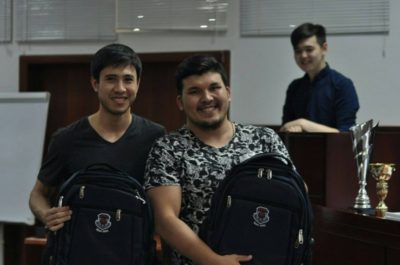Bringing debate to Central Asia – an interview with Kyrgyzstan
Kanat Nogoibayev and Chyngyz Ibraimov represent Kyrgyzstan for the first time in the history of EUDC. We spoke to them about their hopes for future EUDCs in Central Asia and what debating in a post-Soviet states is like.

Chyngyz Ibraimov and Kanat Nogoibayev from Kyrgyzstan – © private
Achte Minute: Hi, thanks for talking to us. What would you say debating is like in Kyrgyzstan?
Kanat Nogoibayev: We have a strong debating community in our Russian league because most citizens of Kyrgyzstan speak Russian and Kyrgyz, and we have a thousand debaters in the Kyrgyz league but we don’t have a strong debate community in English, especially since we only debate in English for one or two years. Mostly we debate only in Russian, but we have a strong debating community because of our neighbour countries like Kazakhstan. They provide good debate academies like the Nazerbayev Debate Academy and the Central Asian Debate Academy. Most of the world debaters come and provide us with good feedback and training and it’s really helpful for improving our debate skills.
Chyngyz Ibraimov: We’ve noticed that our community is fast growing because we are now trying to develop some free speech movement where people can develop their opinions. This is important because different institutions in our country try to engage in this movement because they feel they can express their ideas or learn something new. This is why debating is fast growing in our region, which is not only important for our community but for our society.
AM: What does being part of a EUDC for the first time mean to you?
KN: It’s really important for us because we didn’t know about the EUDC three years ago, we didn’t know about this opportunity. With this new network and social media we learnt about this opportunity, which is really helpful for us because we can share our experiences and some knowledge with European debaters because we mostly take all the experience from the Russian circuit but it’s not good to learn from a third person. It’s good to take on the natives who really know about this. Also, WUDC is a big tournament we can’t participate in because of our low income – Cape Town, Mexico – we have small airlines and as students we haven’t got the funding. The EUDC is so close and we knew the news media and some debaters who participate here and our main purpose is to emphasise and empower our debaters in this tournament. This can help to improve our English and share our knowledge with new people.
CI: One of the most important things is that we can inspire the future generations to participate because now they can see the chance to compete and participate with high quality debaters. For us, EUDC is the kind of place where we can ask important questions and get high quality feedback from debaters, for example from Oxford University. It’s important for us because we understand that they understand debate better than we do and that’s why it’s a chance where we can have a network and we can learn something from them, gain experience, bring it to our country and ask them to come to our country. On social media, it’s quite difficult. They don’t know us or even about Kyrgyzstan. Here we can represent our country, show that there are some communities, that they can empower us and that they can make debate’s borders broader.
KN: Lastly, about competition. Most strong teams are from different countries with experience and knowledge. We don’t have strong competition and we can easily beat some tournaments on some local level but it’s not good to be best on a local level. You want to be the best on an international level.
AM: In five years in the future, what is your goal for Kyrgyz debating?
KN: Our first goal is bringing EUDC to Astana because it’s so close to us. We can attend this championship. We really believe in that. We can now advertise this to our novices in our practice debate to learn more. They want to volunteer, be part of the team. I see that in five years time, we can have more teams here at EUDC, experienced debaters who can break here because i don’t think we’d have a lack of knowledge, we can beat other teams if we learn for two years. The biggest problem is with practice and if you have more practice it can be resolved in the future.
CI: The main purpose is that in a few years the people of our community can win international tournaments, that they can break. We believe that we want to see these people to be able to do that and be interested. Most of them don’t know about EUDC and don’t see it is possible to participate here. In five years, they are able to participate and be interested.
KN: We, as a post-Spoviet country, don’t have opportunities and support from the government like in European countries where it is more likely that you will support the debate community. It’s not normal for us. They think critical thinking is not good to run the country and some problems with autocracy in our region and through spreading debate, we can influence the news to speak out about the problems we have now. We can spread this culture to the public where they see the problems and we can construct dialogue about the main issues in our country.
AM: Well, we wish you good luck! Thank you for talking to us!
vik./lok.





